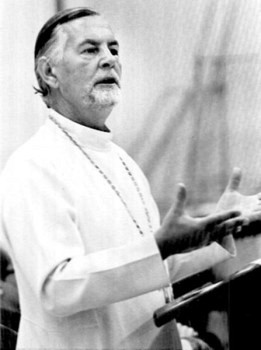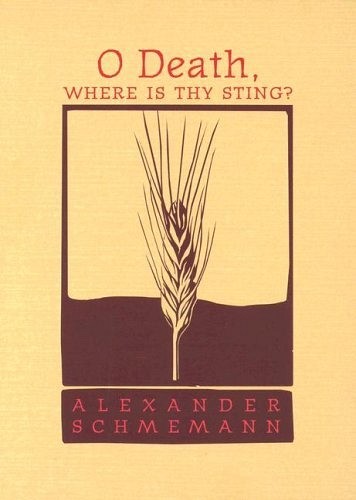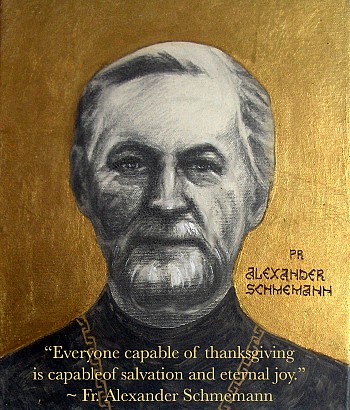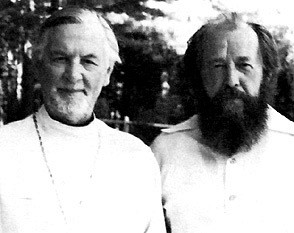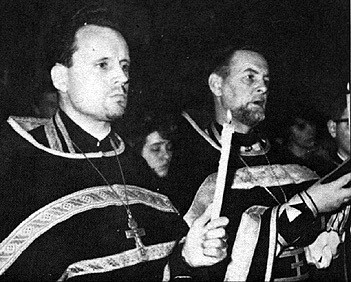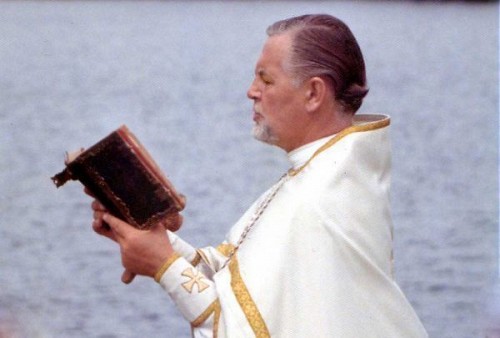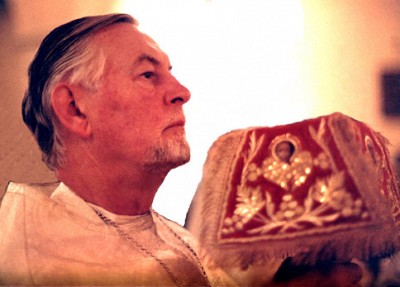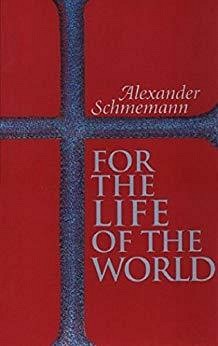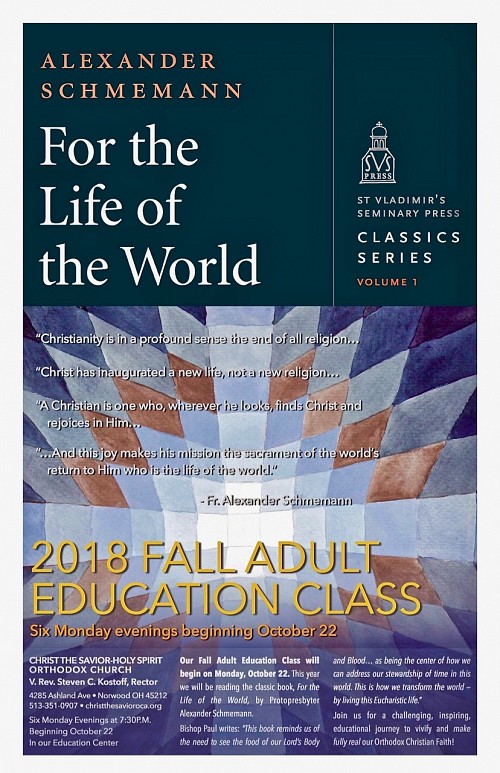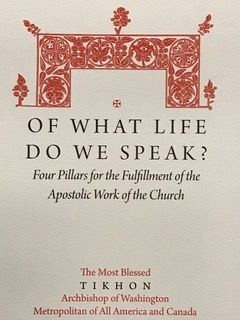Welcome to our special page for our 2018 Fall Adult Education Class, in whch we are studying the classic book by Fr. Alexander Schmemann, 'For The Life Of The World'.
NOTE: SVS Press has announced the availability of the new edition of 'For The Life Of The World', in both paperback and hardcover. This updated edition of Fr. Alexander Schmemann’s classic text includes a new foreword by Dr. Edith M. Humphrey, along with new explanatory notes and an index. Learn more here, including links to order the paperback and hardcover editions.
Scroll down for Class Notes and Discussion Questions from Father Steven (in reverse chronological order), our flier and info on the class, with links to order this classic text, as well as two fascinating videos on the life and importance of Protopresbyter Alexander Schmemann.
Dear Class Participants,
"All good things must come to an end.'
We concluded this year's Fall Adult Education Class with a pretty intense discussion of an Orthodox Christian understanding of death. And this understanding is based on Christ's victory over death as eloquently presented by Fr. Alexander Schmemann. The resurrection of Christ is God's response and "solution" to the "last enemy" that casts a shadow over life.
I hope everyone shared my enthusiasm and sheer joy in reading a real "classic" that reminds us of the depth of beauty of Orthodoxy. A well of "living water" that we can draw on to quench our spiritual thirst throughout all the days of our life - and "beyond" of course!
Presvytera brought up a remarkable talk by a certain Archimandrite Vasileos of Mt. Athos that I shared sometime in the past, and which I am now attaching to this letter. A really profound meditation on the victory of Christ over death written with utter clarity and conviction. Here is the essence of the Gospel crystalized in two pages. Please read this at your convenience:
'Dying and Behold We Live' - Archimandrite Vasileios of Mount Athos
Fr. Schmemann has two other fine books on the subject of death that are both excellent and deeply insightful. Here are links to both in case you are interested:
This second one was recently published posthumously and it offers a look at the actual funeral service and other rites with the view of rediscovering the paschal message of the funeral service.
I really enjoyed this Fall's class - and hope you did also! We had around twenty-five participants all together "in and out" for the six sessions which was encouraging.
Fr. Steven
* Be sure to read Fr Steven's recent Meditation on the significance of Fr Schmemann's work: 'He is Life itself and, therefore, my life...'
Dear Class Participants,
We will discuss Ch. 4 of For the Life of the World Monday evening, beginning at 7:30 p.m. This chapter actually covers three of the Sacraments: Baptism. Chrismation and Confession. Here are some questions and discussion points:
SEC. 1
+ What has led to a reduction in our understanding of a "baptismal Liturgy" according to Fr. Alexander? How does the preoccupation with validity reduce our understanding and experience of the Sacraments?
+ How were Baptism and Pascha related in the early Church?
SEC. 2
+ How does the "Liturgy of the Catechumens" relate to Baptism?
+ What is the purpose of the exorcisms? How does the demonic manifest itself in the world?
+ What does Fr. Schmemann mean with a sentence like this: "The world from which the human being has received his life, and which will determine this life, is a prison?"
SEC. 3
+ What is the dual meaning of water (opening paragraph)? How does the baptismal service reveal this dual meaning?
+ Here is a good sentence/thought to discuss (bottom of p. 72): "The blessing of water signifies the return or redemption of matter to this initial and essential meaning."
+ What does it mean to resist the "self-sufficiency" of the world?
SEC. 4
+ How is Chrismation/Confirmation the "personal Pentecost of man?"
+ How can a certain type of "piety" undermine the catholicity of the Church+? (p. 76)
SEC. 5
+ How does the Sacrament of Confession (Fr. Schmemann uses the term "penance") relate to the Gift of forgiveness?
+ How is Confession/Penance a return to "the newness of life?"
These are just a few questions that we can discuss. We again have a very rich chapter ahead of us on Monday! Please remember to highlight one or two of your "favorite" passages.
Fr. Steven
2018 FALL ADULT EDUCATION CLASS
For the Life of the World
by Protopresbyter Alexander Schmemann
- Monday Evenings beginning October 22
- at 7:30PM in our Education Center
- Links to order provided below
Dear Parish Faithful,
"Christ has inaugurated a new life,
not a new religion."
- Fr. Alexander Schmemann
On Monday evening, October 22, we will begin our annual Fall Adult Education Class. And, as in the past, this class will be comprised of six sessions, thus ending on Monday, November 26. I am very much looking forward to this year's class because we will be reading a contemporary Orthodox classic, For the Life of the World, by the late Fr. Alexander Schmemann - of blessed memory we should add.
This year will be the fifty-fifth anniversary of its publication in America, so it is most appropriate to read this book together as a group and discuss the seemingly endless stream of insights that Fr. Schmemann imparts through his inimitable style. (This year is also the thirty-fifth anniversary of his death in 1983).
There is no doubt that this book has had an enormous impact on countless Orthodox — and for that matter, non-Orthodox — Christians since its initial publication. In fact, many members of the Orthodox Church today will point back to the impact this book had on them, thus leading them to the Church as a result. Although a "cradle Orthodox" myself, this book was a "life-changer" in my own spiritual development and was a key factor in my decision to enter St. Vladimir's seminary and study under Fr. Schmemann who was dean during my three years there. That in itself was an unforgettable experience.
The All-American Council in St. Louis just this past summer had as its central theme, "For the Life of the World." These are the words of Christ from the Gospel (JN. 6); but nevertheless this is a clear allusion to the title of Fr. Alexander's famous book that more than any of his others enables us to grasp his essential vision for the Orthodox Church in America: simultaneously sacramental, eucharistic and eschatological. And indeed, his son Serge addressed the entire body of assembled delegates and delivered a vey moving tribute to his father.
Further, Metropolitan Tikhon wrote a long extended essay of 60+ pages that was clearly linked to Fr. Schmemann's book, in that it was entitled "Of What Life Do Speak?" We will use this text as a kind of supplement to our main text.This very fine document is available on the OCA website, and can be downloaded there.
In addition, this booklet is now available in an attractively printed and bound form from St. Tikhon's Seminary Press. If you would like to have it in that form at a relatively inexpensive cost, here is the link to the website.
In For the Life of the World, Fr. Alexander opens us up to a renewed vision of the Sacraments of the Church - especially the Eucharist - revealing the depth of their purpose and meaning that had long been obscured by a kind of "theology of repetition." Although technically correct, such a theology was no longer inspiring. We will also read of his very trenchant critique of secularism, as he was really one of the first Orthodox thinkers to explore secularism in depth and point out its great shortcomings and inability to offer a meaningful worldview. And, surprisingly, we will also learn why Fr. Alexander said "No" to "religion."
There is a good chance that you, like me, have already read this book; and perhaps, like me, more than once. Now we will have the opportunity to read it once again, and this time within an informal group setting where we will be able to share a lively discussion. If you have never read For the Life of the World, here is a great opportunity to finally "treat" yourself to a great classic of Orthodox literature.
Please download the attached flier announcing and promoting this year's Fall Adult Education class and share it with anyone else that you may think would be interested.
- Fr. Steven
Links to order and download For the Life of the World:
Dear Parish Faithful and Friends in Christ,
19th AAC: "For the Life of the World" from St Vladimir's Seminary on Vimeo.

